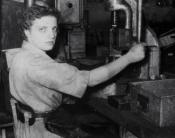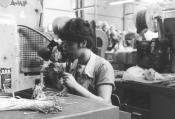Browse the interviews
Sorted by factory location
Merthyr: Courtaulds
VSE025 Mair Richards, Forma, Merthyr;Kayser Bondor, Merthyr;Courtaulds, Merthyr;Chard's, London;AB Metals, Abercynon;Barton's, Merthyr
Mair left the grammar school because of her father’s ill-health, at 15½ and worked for W.H. Smiths before joining Kayser Bondor c.1952. Her mother was against her working in a factory. She describes the interview, the spotless factory – timing of toilet breaks; hand-cutting – shades and sizes of materials; producing bras and slips in huge orders; the importance of KB for Merthyr. In Dowlais (1960 onwards) they made silk stockings and other garments. She remembers raising money in the factory after the Aberfan disaster. She notes the Xmas celebrations; the rate of pay, unions, one strike for pay and how Courtaulds treated them. Accidents with the cutting knives. She didn’t like working at A.B. Metals – it was dirty and the girls were different. She returned to KB and when it closed she moved to Barton’s and then to Forma – supervising the cutting room. She finished in 1995.Merthyr: Forma
VSE025 Mair Richards, Forma, Merthyr;Kayser Bondor, Merthyr;Courtaulds, Merthyr;Chard's, London;AB Metals, Abercynon;Barton's, Merthyr
Mair left the grammar school because of her father’s ill-health, at 15½ and worked for W.H. Smiths before joining Kayser Bondor c.1952. Her mother was against her working in a factory. She describes the interview, the spotless factory – timing of toilet breaks; hand-cutting – shades and sizes of materials; producing bras and slips in huge orders; the importance of KB for Merthyr. In Dowlais (1960 onwards) they made silk stockings and other garments. She remembers raising money in the factory after the Aberfan disaster. She notes the Xmas celebrations; the rate of pay, unions, one strike for pay and how Courtaulds treated them. Accidents with the cutting knives. She didn’t like working at A.B. Metals – it was dirty and the girls were different. She returned to KB and when it closed she moved to Barton’s and then to Forma – supervising the cutting room. She finished in 1995.Merthyr: General Electric Company
VSE026 Marjorie Collins, Hitachi, Hirwaun;Lines (Triang), Merthyr;General Electric Company, Merthyr
Her family background. Marjorie went to Technical college and left at 15 (1943) and worked in the Rediffusion office before going to Lines for three months before getting pregnant (1949). Dirty work but enjoyed company. Xmas fun. Returned there (1951). Welding and riveting toy push-chairs. Doing up their home. Told to take it easy in work – spoiling the rate for the men. Men teasing her. Factory (Triang) also made full size prams etc. Singing. Worked in a garage for years then. Then to GEC in Merthyr (?when she was 49 -1977) and then to spotlessly clean Hitachi factory, Hirwaun – full-time. In Merthyr making circuit boards – and likewise in Hitachi but also other jobs there. Japanese boys not allowed to fraternise with local workers. In the beginning Japanese said there were too many ‘white-heads’ there – then realised they were good workers. Younger workers spent time in toilets. Describes the solder bath at GEC. In those days if you didn’t work you were existing not living. She finished when she was 60 (1988).
Merthyr: Guest Keen and Nettlefold (GKN)
VSE015 Luana Dee, Sobells, Aberdare;TBS South Wales Ltd, Merthyr;NATO clothing factory, Rhymney;Guest Keen and Nettlefold (GKN), Merthyr;Thorns, Merthyr;Berlei Bras, Dowlais;Lines (Triang), Merthyr
Luana talks about her colourful family background and returning from abroad to MT. She left school at 15 (1967) and shortly afterwards began working in Berlei Bras as a machinist (2 years). Mixture of shy and assertive girls there. Brilliant German Pfaff machines. Fashion parades with employees modelling – lingerie. Piecework – paid per bra. Seconds thrown in bins and had to repair – not earning then. Eyesight good and she was fast so put on black bras. More difficult and so loosing money. But she was moved to stop her making trouble. Threatened because she stirred things up. Had to ask to go to toilet and supervisor knocking door. Watching them all the time. Sacked – quality of work? Or too forthright? Straight into another job. In BB’s - fashion parade on factory floor itself - Miss Berlei Bra competition? Describes factory. Sexual innuendo common. Xmas dance and trips. Next – Triang Toys sewing heavy duty upholstery (stayed 1 year). Some toy-making. Having fun with the factory boys in Cyfarthfa Park on Fridays afternoons. Some men brought in pornographic photographs – eye opener. Went to Thorn’s making filaments for light bulbs. Describes process. Japanese took over, it became stressful so she stayed less than a year. Moved to make industrial clothing for NATO – heavy duty sewing, more humanity here. In the TSB they made filing cabinets and she connected with the other workers. She was in the office now. In Sobell’s for a few weeks only - very large, industrial and alienating.Part of this interview is available as an audio file
Merthyr: Hoover
VSE028 Marion Blanche Jones, Hoover, Merthyr;Teddington Aircraft, Merthyr;Birmingham Small Arms, Dowlais;AB Metals, Abercynon;Kayser Bondor, Merthyr
Marion left school at c.16 (1951) and started in Kayser Bondor – until 1958. She feels they were pushed form pillar to post and so she left. Didn’t have a permanent job there so difficult to earn well. Singing and waving to their favourite songs. Moved to AB Metals – making TV tuners. Made redundant after 2-3 years – TV unit closed. In Kayser Bondor not earning much – crying coming home. Loved working In AB Metals. Gave her mother all her wages until she died (1960). Next to BSA making parts for guns. – closed down after a year. Then to Teddington’s making parts for aeroplanes. Cleaning coils under a microscope. Then to Hoover’s 1963. £10 a week and a weekly, monthly and Xmas bonus. Then equality became an issue. Member of union and shop steward. Working on new disposal bags. Once Equal Pay Act ,1970 passed – men became bitter. They knew Ford’s women (Dagenham) had had equal pay. Women contacted Ann Clwyd for advice. They went to management but convenor said they weren’t doing the same work as men. Men went on strike but had to give in, but animosity for years. Not fighting firm but the union. Describes changes in machines. C. 7000 employees in three MT factories. Hoover’s recognised 5,10,15,20 and 25 years service- necklaces. Good staff discounts. Years of wear and tear on body. Noisy and compensation. Section dos, but things changed as other companies took over. Left in 1992 after 29 years.

VSE053 Betty Probert, Hoover, Merthyr;OP Chocolate Factory, Merthyr
Betty left school at 16 (1946) and started in O P Chocolates (until 1954) with her twin sister. She was in the packing dept. Also helped in basement with the line, making chocolates or in the boiled sweets section. Heavy work. They also made wafer biscuits. You could eat as much as you wanted. They had broken biscuits in bags. Union supported her when she refused to do the heavy work. Records, talking and singing. Sending notes with chocolates ‘If married, pass us by, if single, please reply.’ Her sister met a man from Holland in this way! Dusting chocolates with feather duster. Factory moved to Dowlais. Lots of the girls moved to Hoover’s. Describes the different jobs she did there on washing machine. Training in London. All girls on assembly. She had an accident and compensation - £60 – before tribunal. Union – her friend was a shop steward. Monthly and Xmas bonuses. She had a washing machine, tumble drier and a cleaner (cheaper) when there. She can still have these today. Equal pay strike – women on big machines. Not aware of the Dagenham strike. Dancing in canteen and table tennis facilities. Sports Day – factories competing . Concerts – mentions singers. Smoking on factory floor. Holidays. Still meet up – cricket club. She left Hoover’s in 1989. Gold watch for 25th + £30; £100 for 35 years. Monthly pension and redundancy pay. ‘Home from ‘home’.Merthyr: Kayser Bondor
VSE024 Irene Hughes, Kayser Bondor, Merthyr
Irene left school at 16 (1949) and started in Kayser Bondor on March 9th. She was on the strapping section for 25 years and then on the lathe in cutting. She fed two machines at the same time. Then the straps were cut and then to the bucklers. Then changed to ribbon straps. She took work home every night to keep up. ‘Chinese labour’! Those making garments earned more .She gave all her money to her mother. Shop for Not Quite Perfect things for sale. On strike for wages and picketing – cooking on wood fire outside. Needles through hand – and in hospital – operation to get them out. Also lost top of thumb- clip stitched it back. £200 compensation. One girl lost her hair – bald. In canteen, same music everyday ‘Itsy bitsy’ and on wall slogan ‘Output is the main key to prosperity’! Noise gave her tinnitus. Quarrelled with men for not pulling weight. Had a laugh at army boys learning to sew. Cycling to work. Worked in Kayser Bondor in Merthyr and Dowlais. Hockey and football teams.Lovely Xmas concerts. Ten and 21 year clubs. In 21 year club given 21 guineas and bought Rotary gold watch. Also had nightie and negligé for not missing work. Reunion. Made redundant at 51 (1984).VSE028 Marion Blanche Jones, Hoover, Merthyr;Teddington Aircraft, Merthyr;Birmingham Small Arms, Dowlais;AB Metals, Abercynon;Kayser Bondor, Merthyr
Marion left school at c.16 (1951) and started in Kayser Bondor – until 1958. She feels they were pushed form pillar to post and so she left. Didn’t have a permanent job there so difficult to earn well. Singing and waving to their favourite songs. Moved to AB Metals – making TV tuners. Made redundant after 2-3 years – TV unit closed. In Kayser Bondor not earning much – crying coming home. Loved working In AB Metals. Gave her mother all her wages until she died (1960). Next to BSA making parts for guns. – closed down after a year. Then to Teddington’s making parts for aeroplanes. Cleaning coils under a microscope. Then to Hoover’s 1963. £10 a week and a weekly, monthly and Xmas bonus. Then equality became an issue. Member of union and shop steward. Working on new disposal bags. Once Equal Pay Act ,1970 passed – men became bitter. They knew Ford’s women (Dagenham) had had equal pay. Women contacted Ann Clwyd for advice. They went to management but convenor said they weren’t doing the same work as men. Men went on strike but had to give in, but animosity for years. Not fighting firm but the union. Describes changes in machines. C. 7000 employees in three MT factories. Hoover’s recognised 5,10,15,20 and 25 years service- necklaces. Good staff discounts. Years of wear and tear on body. Noisy and compensation. Section dos, but things changed as other companies took over. Left in 1992 after 29 years.

